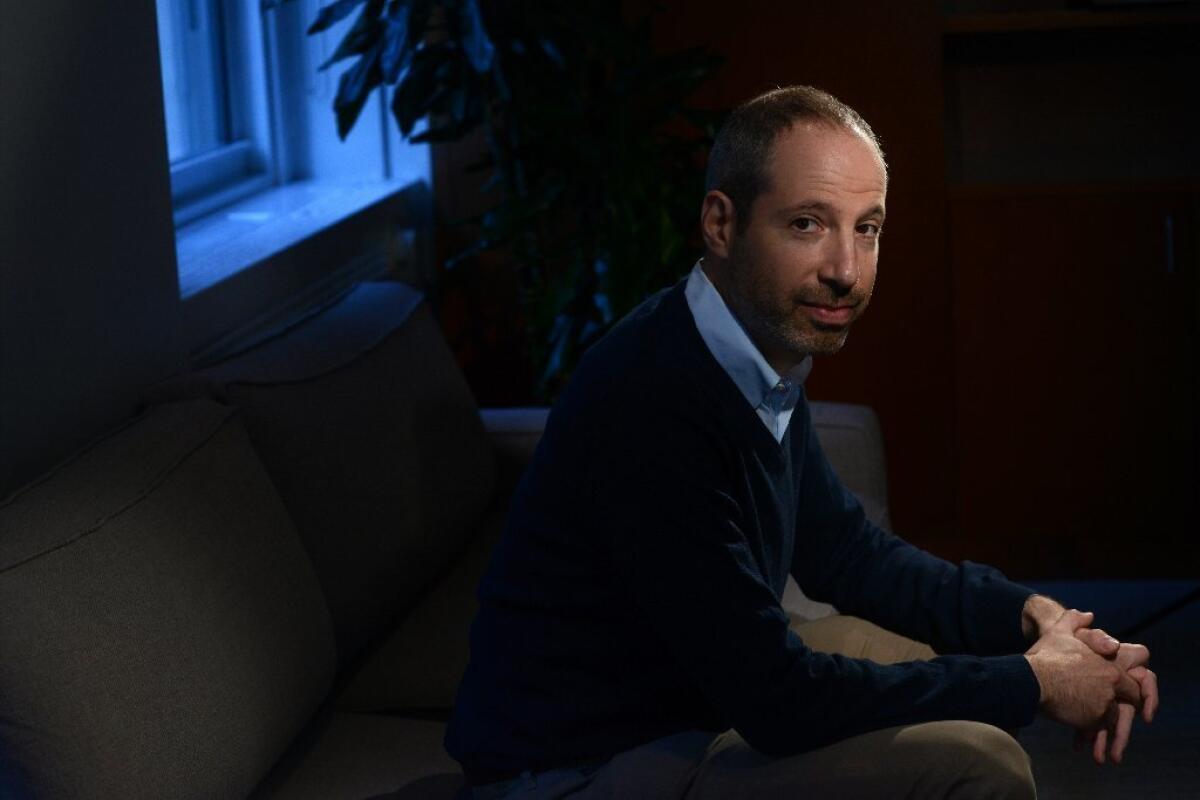‘Jackie’ screenwriter says that revealing the real Jackie Kennedy took decades to accomplish

- Share via
“Jackie” is the first screenplay I ever wrote, but it’s been “in development” for over three decades.
I’ve been fascinated by Jacqueline Kennedy since I was a child. My mother grew up in a small, two-bedroom apartment in Scranton, Penn. Not a lot of breathing room, let alone storage space for memorabilia. And yet, she saved one box — filled with yellowing newspapers and crumbling magazines, printed in fall 1963.
Over the years, visiting that apartment with my mom, I’d leaf through the fading images of the president’s veiled, heartbroken widow. I didn’t really understand why my mother had saved them. But I knew that this moment in history — and this woman — mattered deeply to her.

“Jackie” follows First Lady Jacqueline Kennedy, played by Natalie Portman, after the assassination of President John F. Kennedy.
I’ve always loved movies but found a career in journalism. Chris Matthews gave me my first job out of college, writing and producing for him on “Hardball.” Chris is a Kennedy historian, author of two books on the subject, and one of the great raconteurs of all time. Through long days and nights in the office, suffice it to say we talked a lot about the Kennedys.
Jack is fascinating. Bobby, more so. (I’d still love a crack at his story.) But Jackie… I kept coming back to Jackie.
I couldn’t shake the feeling that, like so many women in history, her story had never really been told. Sure, she’s been portrayed on the page, on television, even in film. But always as a mannequin, a fashion icon, a beleaguered spouse suffering the indignities of her husband’s infidelities. Never as a fully realized human being. Further, my time covering politicians had taught me one thing — there is almost always a gaping chasm between a person’s public persona and who they really are. And history is often mythologized to the extent that it rarely resembles actual events.
So when I finally mustered the will to leave the news and make a go of it in Hollywood, I had this vague notion rattling around in my head. The opportunity of an untold story.
Searching for a way in, I dove into the research. Books, articles, primary sources stored at the Kennedy Library. And I discovered something (I found) truly extraordinary. The Kennedy years weren’t always described as “Camelot.” In fact, the first time the reference appears is in an interview Jackie gave one week after her husband’s assassination.
With that discovery, I knew I had a movie. Seven days. A woman who’s just witnessed her husband’s murder. (Not just witnessed — showered in his blood and brains!) In one week, with the entire world watching her every move, she has to comfort her two small children. She has to vacate her home. She has to plan a funeral. And yet, somehow, miraculously she has the presence of mind to recognize this is her last and only chance to define not only her husband’s legacy, but her own place in history. And, oh, by the way, she was only 34 years old.

For her role as Jackie Kennedy, Natalie Portman says, “It’s not a fashion story,” but the clothes do tell a story.
Three feverish weeks later, I had a rough draft. I sent it to the only person I knew in the movie business — Franklin Leonard. He assured me it wasn’t embarrassingly bad. Soon thereafter, I sold the project with Darren Aronofsky attached to direct. I thought to myself — it can’t possibly be this easy.
And, of course, it isn’t. Not even close. The ensuing six years of false starts and every variety of Hollywood calamity are best summarized by the following email exchange with Darren.
Me: Why the hell hasn’t Jackie been made yet?!
Darren: I’m sorry for your disappointment. But filmmaking, as you know, is full of ’em.
Darren was not only right about that, he was right to be patient. Having moved into a producer capacity, he assured me he was waiting for the right director. And he did me the best favor of my creative life by finding Pablo Larraín.
Once Pablo boarded the project, he encouraged me to dig deeper into every scene, find more emotional depth and take more imaginative liberties. Every note helped me elevate that original draft.
And then he convinced Natalie Portman to play Jackie.
From those old magazines in a box in Scranton to this film’s premiere on a movie screen in Venice, it’s hard for me to believe my good fortune. It’s been a dream. It’s been Camelot.
See the most read stories this hour »
ALSO:
When does a book’s author help or hurt the screenwriter’s vision?
Taylor Sheridan delves into personal and social themes with ‘Hell or High Water’
Eddie Murphy returns and remembers being ahead of the curve on #OscarsSoWhite
More to Read
Sign up for The Envelope
Get exclusive awards season news, in-depth interviews and columnist Glenn Whipp’s must-read analysis straight to your inbox.
You may occasionally receive promotional content from the Los Angeles Times.







